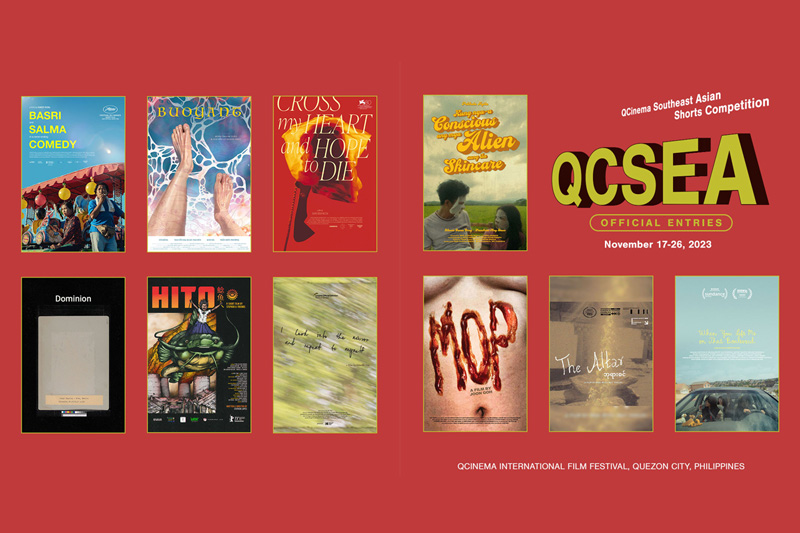These are our capsule reviews of this year’s QCSEA Shorts. We wish these filmmakers the best of luck and here’s hoping their short films gain more traction wherever else in the world.
The dystopian near-future of Stephen Lopez’s Hito feels bizarre and unfamiliar at certain points, yet feels familiar in all the right ways: a raucously funny satire full of references from various forms of media (such as a Cowboy Bebop nod at the very end), the film shows us the dangers of forced mono-ideological thought, where unity for its own sake is meaningless, where the gold in the “golden age” is the golden color of shit.
I’ve been to a couple of parties in North America with immigrant family members, and with only small variations they’ve felt a lot like the party in Kayla Abuda Galang’s When You Left Me on That Boulevard. The film radiates anxious energy – stemming from awkward social situations with drunk aunties to the awkwardness of navigating between two disparate, sometimes at-odds cultures.
Despite a slew of technical problems that turned the film into a slideshow, Khozy Rizal’s Basri and Salma in a Never-Ending Comedy is one of my favorite shorts of the program. It adroitly portrays the struggles of a childless couple in very conservative Indonesia, where the social expectations and pressures to bear children affect not only the woman, but also the man – where having (many) children is considered a mark of virility and manhood.
The Thing About Aliens and Their Skincare makes its metaphors quite clear, complete with cute explainer about how our LGBTQ+ brothers, sisters and nonbinary siblings are just normal people trying to get by, even as segments of society treat them differently. It’s a very simple, sweet film. However, though the understanding that we gain in the film isn’t extended to the characters in the film who do not understand, and things remain more or less at status quo near the end.
In learning certain kinds of relationship dynamics, important things to know would be who is in control, who is using who, and what the rules of the relationship are. In The Mop, that knowledge is made ambiguous; learning these dynamics becomes a game that takes its audience in many different and unexpected directions.
Sometimes we learn how small and unimportant we actually are in the grand scheme of things – The Altar meditates on that thought, on how we are often buffeted from all sides by forces beyond our control and understanding. It is also a confession as much as it is a meditation, with its invisible narrator whispering to us the details of their ‘sin.’
Buoyant starts with the discovery of a mermaid at a sea market – and through dance, tells the tale of freedom of various sorts, borne through empathy and acceptance. It’s quirky and ends in a very cute fashion.
The title of Cross My Heart and Hope to Die implies a promise – but in an overly exploitative capitalist society where everyone uses everyone else in an endless chain of exploitation, such promises hold no water, such relationships find their foundation built on lies. Jorrybell Agoto’s working class protagonist finds herself exploited in more ways than one – caught up in the machinations of men who employ her, or men who seek to use her for their own means.
Families can sometimes be complicated, their histories built on unspoken pain and unshared feelings. Director Giselle Lin explores the complicated relationships between herself, her four sisters and their estranged parents in I Look Into the Mirror and Repeat to Myself, where she unearths shared traumas and experiences that solidified – and broke apart – their bonds as siblings.
And finally, while I get the sentiment behind Dominion – an exploration of colonialist legacies in settled lands through old pictures, I am not fully sold on the execution. While providing context through (subtitled) narration is okay, why not show the pictures themselves? The visuals and narration doesn’t always line up, and much of what is narrated could be better off shown instead, allowing us to take in their power first hand instead of a second hand description through text. Like the Tenacious D song, it’s not the greatest (short) in the world – it’s just a tribute.
This review first appeared on John’s blog here.


